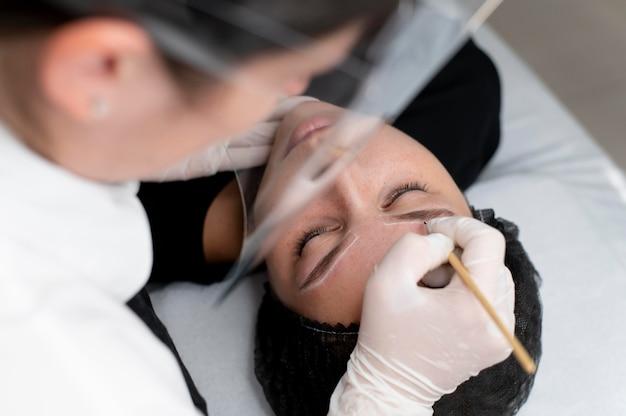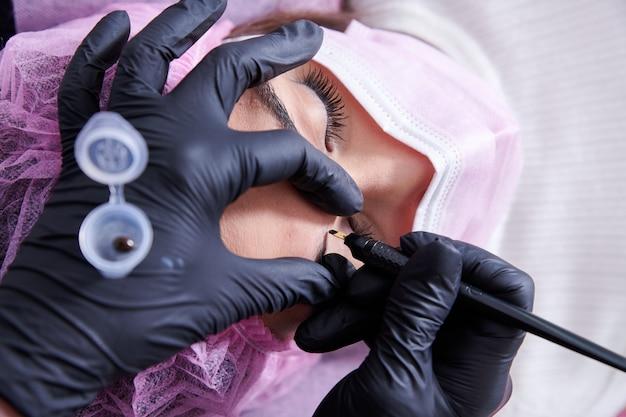When it comes to achieving flawlessly defined eyebrows, microblading has become the go-to solution for long-lasting beauty enhancements. However, one question often lingers on the minds of beauty enthusiasts: Is eyebrow microblading permanent? While microblading does provide a semi-permanent silhouette to your brows, its durability can span from one to three years, depending on various factors. Unlike traditional tattooing, which is designed to endure a lifetime, microblading is a more surface-level procedure that requires touch-ups for maintenance. In this article, we’ll delve into what determines the permanence of microblading and where you can make cosmetic eyebrow tattoo Melbourne .
The Basics of Eyebrow Microblading

Eyebrow microblading is a popular cosmetic procedure that employs a hand-held tool with tiny needles to apply semi-permanent pigment into the epidermis, the top layer of the skin. This technique creates the illusion of fuller, well-defined eyebrows by meticulously replicating the appearance of hair strokes. It’s particularly sought after by those looking to enhance or resurrect their brow arches, fill in gaps, or fully reconstruct brows where little to no hair exists. The meticulous nature of the process allows for a natural and bespoke brow shape tailored to each individual’s facial structure, offering a personalized approach to eyebrow aesthetics.
The Process of Microblading Explained
To better understand eyebrow microblading, it’s important to walk through the process. Initially, your microblading artist will consult with you to discuss your desired eyebrow shape, color, and overall look. Once the outline is sketched and agreed upon, a topical anesthetic is applied to minimize discomfort. The actual microblading session involves creating hair-like strokes on the skin with the microblading tool to deposit the pigment. This meticulous work requires precision and skill, generally taking about two hours to complete. After the session, the brows must heal properly, during which aftercare is crucial to achieve the best results and prolong the effects of the microblading procedure.
Comparing Microblading to Traditional Tattooing

Microblading differs from traditional tattooing in several ways. Unlike the indelible ink used in tattoos that penetrate deep into the dermis, microblading pigments are designed to fade over time and are deposited closer to the skin’s surface. This approach yields a semi-permanent result, one that needs occasional touch-ups but also allows for changes in brow trends or personal style over the years. The pigments used in microblading are also different; they’re often organic and less inclined to change color, instead simply losing saturation gradually.
The Ink Differences and Skin Layers
The ink utilized in microblading is not the same as that used in a traditional tattoo. Microblading inks are formulated to fade naturally and evenly to prevent discoloration, whereas tattoo inks are made to last forever and might change color to blue or green over time. A table comparing the attributes of microblading to traditional tattooing provides clear insight into their differences.
| Aspect | Microblading | Traditional Tattooing |
|---|---|---|
| Permanence | Semi-permanent | Permanent |
| Depth of Pigment Insertion | Epidermal (top layer) | Dermal (deep layer) |
| Type of Ink | Organic, fade over time | Varied, may discolor |
| Procedure Time | ~2 hours | Varies |
| Touch-Ups | Required | Rarely needed |
Factors Influencing Microblading Longevity
The longevity of eyebrow microblading can be significantly impacted by the client’s skin type. Oily skin types may find that their microbladed brows fade quicker, as excess oils can contribute to the dilution of the pigment. In contrast, those with dry skin may enjoy longer-lasting results. Furthermore, lifestyle choices such as sun exposure and frequent swimming can hasten the fading process. It’s essential to consider these factors when determining how permanent the effects of microblading will be for you.
How Lifestyle and Skincare Affect Microblading
Lifestyle and skincare routines play a pivotal role in the endurance of your microbladed brows. Exposure to sunlight, the use of exfoliating skincare products, and any activity that promotes skin regeneration can lead to faster fading. Here are a couple of key lifestyle factors that may influence the lifespan of microbladed eyebrows:
- Sun Exposure: UV radiation can cause the pigment to break down faster, meaning that regular use of sunscreen can help protect and prolong your microblading investment.
- Skincare Products: Certain ingredients like retinoids and acids can accelerate the fading process and should be avoided around the brow area.
The Touch-Up Process: Maximizing Your Microblading Investment
Just as the hair on your head may require regular trimming, your microbladed eyebrows also need touch-ups to maintain their shape and color depth. Ink fading is an expected part of the process, making touch-ups an integral part of your microblading journey. These touch-ups, typically needed every 12-18 months, are designed to refresh the color and to correct any shape alterations that may have occurred as the ink faded.
Maintaining Your Microbladed Brows Over Time
Consistent touch-ups are critical for keeping your brows looking their best over time. Here are some recommended stages for when to consider getting touch-ups:
- Initial Touch-Up: Often done 4-6 weeks after the initial procedure to correct any irregularities after healing.
- Annual Touch-Up: To combat fading and maintain a vibrant, natural look.
What to Expect: The Fade Over Time
The fading process of microbladed brows is gradual and can vary from person to person. Initially, the color will appear darker and more defined immediately after the procedure. Over time, this will soften to a more natural hue. As the body naturally regenerates skin cells, the strokes will lighten and can eventually disappear completely if no touch-ups are pursued. The overall aesthetic will transition subtly, allowing clients to decide if and when they prefer to refresh their look.
The Transition and Touch-Up Timeline
Understanding the typical timeline of microblading can help manage expectations and plan for future appointments. While individual experiences may vary, a general guide to the transition and touch-ups is as follows:
- Weeks 1-2: Healing stage where brows appear darkest.
- Months 1-3: Pigment settles and true color emerges.
- Months 12-18: Color and strokes lighten significantly and mark common timing for a touch-up.
How to Choose a Reputable Microblading Artist
Selecting a reputable microblading artist is paramount for ensuring that your brows look great and that the procedure is conducted safely. Credentials are a must; look for licensed technicians who have undergone proper training. Additionally, reviewing their portfolio allows you to assess their skill level and whether their art style aligns with your desired outcome. Reviews and testimonials can give you insight into the experiences of past clients and can be invaluable in your decision-making process.
Caring for Your Microbladed Eyebrows Post-Procedure
Maximizing the lifespan of your microbladed eyebrows significantly depends on how you care for them after the procedure. Following the aftercare instructions provided by your technician is critical for preventing infection and for ensuring the pigment heals correctly. Key aftercare practices include keeping the area dry and avoiding makeup application over the brows for a specified period. Strict adherence to these guidelines not only promotes healing but also solidifies the durability of the microblading work.
Do’s and Don’ts Following Your Microblading Session
Here is a summarized list of aftercare do’s and don’ts after a microblading session:
- Do keep the brows dry and clean for at least ten days following the procedure.
- Do apply any healing balm or cream as directed by your microblading artist.
- Don’t pick at any scabs or flakes that may form as the brows heal.
- Don’t expose your healing brows to direct sunlight or tanning beds.
- Don’t immerse your brows in water, such as swimming pools, hot tubs, or saunas.
- Don’t perform exercises that lead to excessive sweating during the initial healing stage.
